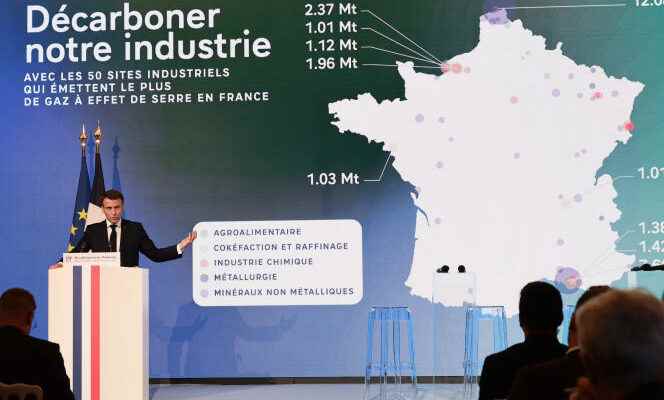A high mass that looks like a general mobilization. The invitation, Tuesday, September 8 under the golds of the Elysée Palace, of the bosses of the fifty most polluting sites in France, was the opportunity for Emmanuel Macron to conclude a “decarbonation pact” with the industrialists. But also to ensure “the French industry team”in the words of the minister in charge of this sector, Roland Lescure, that the government remains at his bedside in the midst of economic and geostrategic turbulence.
The soaring energy prices in Europe caused by the war in Ukraine, but also the acceleration of the imperatives of ecological transition almost everywhere in the world, are indeed undermining the French ambitions for the industry. As part of his supply policy, the President of the Republic had made reindustrialization a marker of his first five-year term: “Choose France” summits each year in Versailles for major international investors, industry component of the recovery plan post-Covid (30 billion euros out of the 100 billion in the plan), France 2030 plan unveiled with great fanfare at the end of 2021. His second term was intended to be placed under the same auspices. This is evidenced by the reduction of 10 billion in production taxes (via the abolition of the contribution on the added value of companies) which, even if it was finally spread over two years, responds to a long-standing demand from business circles. business.
“Since 2016 and the end of the Holland mandate [pacte de responsabilité, crédit d’impôt pour la compétitivité et l’emploi…], the indicators are back in the green in terms of setting up factories, relocating or creating jobs. Something that hadn’t happened since 2009.”, indicates David Cousquer, manager of the firm Trendeo, which regularly publishes a barometer on the subject. And if the crisis linked to Covid-19 has put a stop to this expansion, it has also reinforced the desire for French industrial sovereignty. In the third quarter of 2022, industrial employment increased further by 0.4% (+12,500 jobs), to its highest level since the first quarter of 2015, according to INSEE.
“Risk of industrial stall”
The fact that Europe finds itself, unlike China and the United States, plunged into an unprecedented energy crisis, but also that ecological imperatives are encouraging a return to protectionism, have called everything into question. In the United States, the Inflation Reduction Act (370 billion dollars) aims in particular to subsidize local green production (electric vehicles, etc.). China is also investing massively to revive its economy. Not to mention intra-European competition, with the 200 billion euros put on the table by Germany to protect households and businesses, while the carbon tax at the borders of the Union is still pending.
You have 50.77% of this article left to read. The following is for subscribers only.
